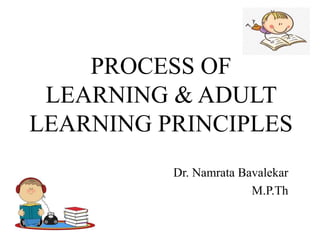
Process of learning
- 1. PROCESS OF LEARNING & ADULT LEARNING PRINCIPLES Dr. Namrata Bavalekar M.P.Th
- 2. Content 1. What is learning? 2. What are its stages? 3. Introduction to adult learning model. 4. What are the principles of adult learning?
- 3. Objectives At the end of this short presentation , participants shall: • Know and understand process of learning. • Better understanding of the principles of adult learning. • Become more effective teachers or facilitators.
- 5. What is learning? • Definition: A change in behaviour as a result of experience or practice. • Most people believe it ends with a degree. • But the learning process never ends. It’s a constantly evolving process as we keep learning new things as we go through our professional and personal lives.
- 6. • Understanding the learning process involves an in-depth look at the various stages of the learning process. • One of the most crucial elements of the learning process is to ensure that learners remain engaged and motivated.
- 7. Stages of learning 1. Unconscious Incompetence. 2. Conscious Incompetence. 3. Conscious Competence. 4. Unconscious Competence.
- 8. 1) Unconscious Incompetence • The first stage of learning is Unconscious Incompetence. This is the stage where the learner has not learned anything yet. The students have no knowledge or skill—and don’t even feel the need to learn a new skill.
- 9. • Potential learners need to be made aware that broadening their learning can add extra value to their skill set. One must know how to create the best learning system to meet the requirements of learners in this stage.
- 10. 2) Conscious Incompetence • The second stage of the learning process is Conscious Incompetence. Here, the learners are aware of the skill or knowledge they lack. They are conscious of what they are missing.
- 11. • As a result, they develop a keenness to know about new things as they are no longer happy to miss out on something that could prove valuable. • This is the stage where the target audience can be most easily convinced to join a course.
- 12. 3) Conscious Competence • The next phase of the learning process is Conscious Competence. This is when the learner becomes familiar with the subject or acquires a skill, but is still not proficient enough to develop it as an automatic reflex or habit. Look at it this way—you have learned the theory; now you have to go through practical exercises.
- 13. 4) Unconscious Competence • The fourth and final stage of learning is known as Unconscious Competence. It refers to attaining a level of expertise where you become an absolute master of the habit.
- 14. • Let’s say it is like typing on your computer. You don’t even pay attention to each stroke—your fingers simply glide over the keyboard to form words that come to your mind. • It is this fourth stage of learning that every learner aspires to acquire.
- 15. Conclusion • The learning process is essential to increase knowledge. Be it your personal or professional life, constant learning is important for everyone. • Understanding the learning and its stages are crucial for all of us. Whether you are just starting your career or are an experienced professional with decades of experience, the learning process should never stop.
- 17. Introduction • Malcolm Shepherd Knowles was an American educator well known for the use of the term Andragogy. • According to him Andragogy is the art and science of adult learning.
- 19. 1) Need to know • To adults, it is need to know why it is necessary for him to learn something. Be aware of the advantages of learning, in fact, seems to be a highly motivating factor, both when those reasons are related to an improvement in the quality of life and when they lead to better work performances.
- 20. 2) Experience • Compared to younger learners, adults have more experience in most cases, they gather their own identity from this background. • On one side that adults training can reach better results if lies on previous knowledge and competences, with programs customised in terms of strategies and modalities.
- 21. • On the other hand, experience can lead to mental rigidity: therefore, adapting programs to real needs of learners becomes even more important.
- 22. 3) Self Concept • Adults have a self concept of being responsible for their own decisions for their own lives. • Once they have arrived at that self concept they develop a deep psychological need to be seen by others and treated by others as being capable of self direction.
- 23. 4) Readiness • Adults become ready to learn those things they need to now and be able to do in a order to cope effectively with their real life situation. • It is not necessarily to sit by passively and wait for readiness to develop naturally, however we can induce readiness by different techniques.
- 24. 5) Orientation • Adults are motivated to learn something to the extent they perceive that it will help them to perform tasks or deal with problems. • They learn new knowledge, understandings, skills, values and attitudes most effectively in a context of application in real life situations.
- 25. 6) Motivation • Adults are responsive to some external motivators but the most important motivators are internal pressures. • All normal adults are motivated to keep growing and developing.
- 26. SUMMARY • Process of learning. • Stages of learning. • Andragogy: A adult learning model. • Principles of adult learning.
- 27. SOURCES 1. Harappa Educations. 2. A theory of adult learning: Andragogy.